












Now completed, the Merced Union High School District’s newest high school, El Capitan, currently serves 735 freshman and sophomore students. During the next two years, the school will increase to a student population of approximately 1,600 and serve grades 9-12.
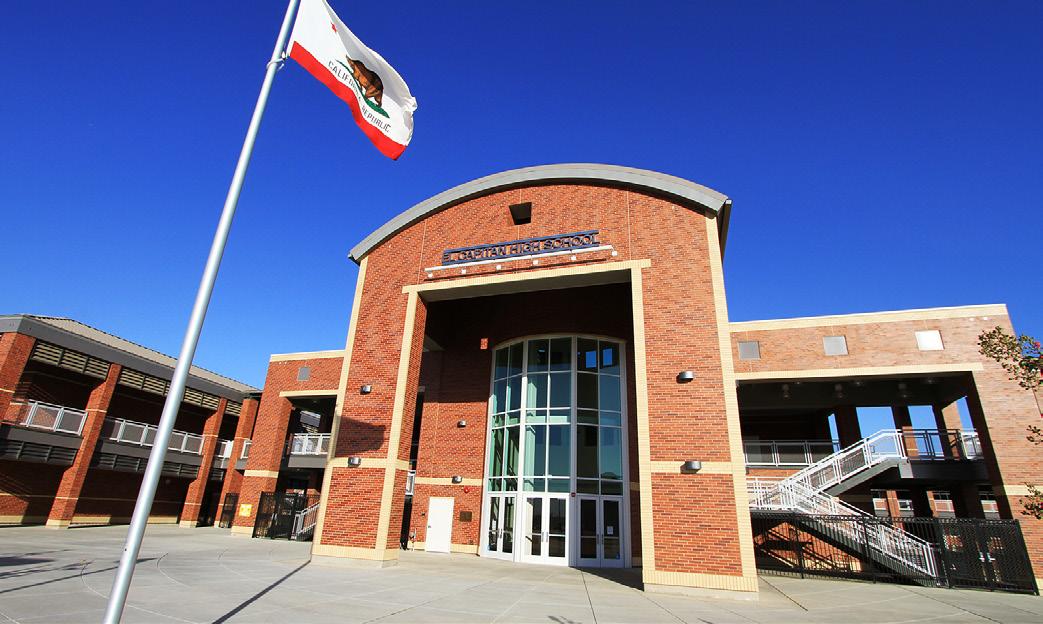
Merced County schools were incorporated more than 150 years ago in 1856 when the first County Superintendent of Schools, William Nelson, petitioned the Board of Supervisors to divide the county into three school districts.
The 1860 census reported a population of 1,141 in Merced County and in 1863, the Schools Superintendent reported an enrollment of 267 children and a county schools budget of $1,000.
The first high school was established in 1895 with 27 students and two teachers under the administration of the County Board of Education. In 1897, a new high school was completed on the corner of 22nd and M Streets in Courthouse Square.
Today, there are 20 school districts with their own Boards of Trustees and Superintendents serving more than 56,000 K-12 students with Steven E. Gomes, Ed.D., serving as the 28th County Superintendent of Schools.
COVER PHOTOS: Clockwise from top left, Luis Salcedo instructs a math class at Hoover Middle School in Merced, UC Merced Get S.E.T. service learning students work with middle school students at Dinner With a Scientist and students perform in the Merced County Education Foundation performance of “The Wizard of Oz.”
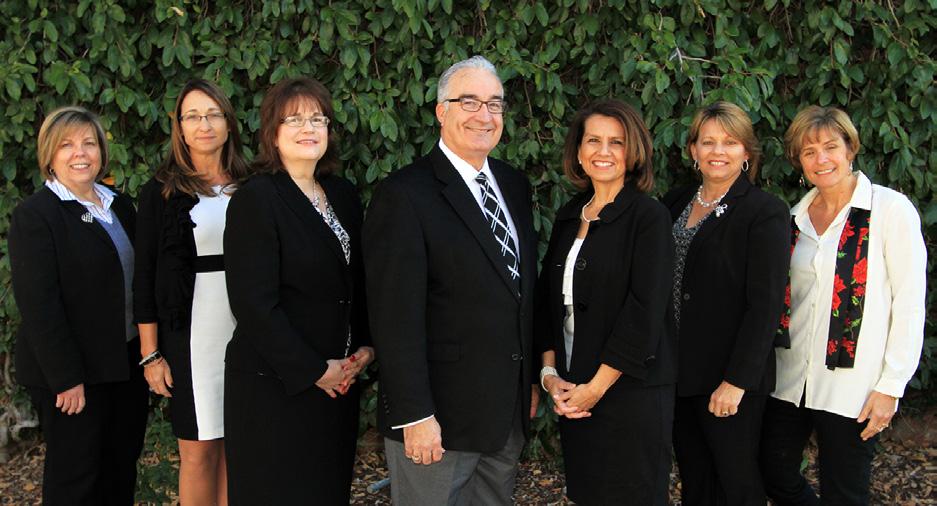
Holly Newlon
This document focuses on the achievements, highlights, struggles and other aspects of Merced County’s 20 school districts and nearly 70,000 P-12 grade students. This report tells the story of how 9,000 teachers and support staff are working hard every day at 114 school sites to provide our children with an excellent education.
Christie Hendricks Assistant Superintendent Early Education
Janet Riley Assistant Superintendent Business Services

Too often, headlines depict a failing school system. Although the process can always be improved, the reality is that the schools in our county are far from failing. Most county residents are surprised to learn that the percentage of Merced County students enrolling in higher education ranks sixth in the state.
to Merced County and districts like Weaver and Los Banos have seen increases in enrollment.
Merced County has gone through some tough times economically and socially. However, I remain optimistic about its future. I look at the growth in school enrollment this past year, the beginning of new housing construction, the move toward adequately funding our schools based on need and paying schools for money owed to them from previous years, a decrease in foreclosures and an increase in property values.
We are poised for success.
More than 55 percent of our high school graduates are entering higher education and now that UC Merced is a choice, perhaps they will not leave the area to earn their post-secondary degree. We want our college-educated students to find jobs here and become the workforce that will bring businesses to Merced County.
Eva Chavez Assistant Superintendent Human Resources
Susan Coston Assistant Superintendent Special Education
Kathy Pon, Ed.D. Assistant Superintendent Instructional Services
For more information about this report’s sponsors, see page 15.
This report will highlight and explain the transitions taking place in the California educational system. Some of those transitions are unique to the Golden State, while others are not. In California, we are changing what and how we teach, how we measure student achievement, how we hold schools accountable, how we fund our schools and how we will require districts to produce a Local Control Accountability Plan in order to spend their state funds. Any one of those changes would be substantial to accomplish in one year!
Voters in California passed Proposition 30 giving schools an economic breath of air and I have included how those funds have been spent in 2013. The new school funding formula called Local Control Funding Formula was very favorable to schools in Merced County.
As the mortgage crisis has diminished, more students have returned
I am proud that MCOE has 1,500 full and part time dedicated employees providing services to school staff, parents, students and the community in three counties
I am also proud of the hard work the teachers and support staff do to educate our children every day in our 20 school districts and humbled to serve as your county superintendent. I hope you will find this report informative and a glimpse behind the school doors.
In advance, I want to thank you for reading this report and gaining a greater understanding of Merced County education.
In the 2012-13 school year, there was a modest increase of 184 Transitional Kindergarten (TK) through 12th grade students in county schools. This brings the total number of TK-12 grade students to 56,349. According to the 2013 California Child Care Portfolio for Merced County, there are 12,852 children ages 0-4. Of those 12,852 youngsters, 8,660 are 3 and 4 years old, with approximately 40 percent attending preschool, according to the National KIDS COUNT Program.

$ $ $ $ $ $ $ $ $ $ $
Totals include revenue limit, federal, other state and other local funding received through the general fund.
Merced County Office of Education
























California has the largest and most diverse student population in America. Statewide, about half a million students are in each grade level. To provide for their education, more than 300,000 teachers work in about 10,000 schools in about 1,000 school districts across the state. In Merced County, there are about 2,500 teachers in 114 schools in 20 school districts.
With the implementation of the Common Core State Standards in the 2013-14 school year, the Academic Performance Index (API) scores for schools in Merced County, which are based on the Standardized Testing and Reporting (STAR), will be replaced by the California Assessment of Student Performance and Progress (CAASP) system.
Ada Givens Elementary
Aileen Colburn Elementary
Alicia Reyes Elementary
Allan Peterson Elementary
Atwater High
Ballico Elementary
Bellevue Elementary
Bellevue Senior Elementary
Bernhard Marks Elementary
Bryant Middle
Buhach Colony High
Campus Park Elementary
Cesar E. Chavez Middle
Charles Wright Elementary
Charleston Elementary
Cressey Elementary
Delhi High
Don Stowell Elementary
Donn B. Chenoweth Elementary
Dos Palos Elementary
Dos Palos High
El Capitan Elementary
El Nido Elementary
Elim Elementary
Elmer Wood Elementary
Farmdale Elementary
Frank Sparkes Elementary
Franklin Elementary
Golden Valley High
Green Valley Charter
Gustine Elementary
Gustine High
Gustine Middle
Harmony Elementary
Henry Miller Elementary
Herbert H. Cruickshank Middle
Herbert Hoover Middle
Hilmar High
Hilmar Middle
Hopeton Elementary
Joe Stefani Elementary
John C. Fremont Charter
John Muir Elementary
Le Grand Elementary
Le Grand High
Leontine Gracey Elementary
Livingston High
Livingston Middle
Lorena Falasco Elementary
Los Banos Elementary
Los Banos High
Los Banos Junior High
Luther Burbank Elementary
Margaret Sheehy Elementary
McSwain Elementary
Merced High
Merquin Elementary
Mitchell Elementary
Mitchell Intermediate
Pacheco High
Peggy Heller Elementary
Pioneer Elementary
Plainsburg Union Elementary
Planada Elementary
R. M. Miano Elementary
Romero Elementary
Rudolph Rivera Middle
Schendel Elementary
Selma Herndon Elementary
Shaffer Elementary
Snelling-Merced Falls Elementary
Sybil N. Crookham Elementary
Tenaya Middle
Thomas Olaeta Elementary
Volta Elementary
Washington Elementary
Weaver Middle
Westside
The chart at left shows two scores for each Merced County school. The API is a single number, ranging from a low of 200 to a high of 1,000, which reflects a school’s, LEA’s, or a student group’s performance level, based on the results of statewide assessments. In addition to statewide ranks, schools are ranked compared to 100 other schools with similar demographic characteristics, educational challenges and opportunities. For the similar schools rank (SSR), schools are ranked into deciles according to school type: elementary, middle and high. To determine the similar schools rank for a school, a comparison group of 100 similar schools of the same school type is formed for that school, based on similar demographic and other characteristics.
* School does not have large enough sample for accurate reading.



Jennifer Anaya knew at a young age she wanted to go to college and, thanks to a supportive family, is fulfilling her dreams at UC Merced.
The third year Economics major followed her sister’s footsteps at the university, with her younger brother not far behind her.
“From a very young age, we saw the growth of UC Merced. We always knew what college was and my parents emphasized the importance of a college education,” she says.
Her sister, Dulce Maria, is a UCM graduate and now works as the Coordinator of New Stu -
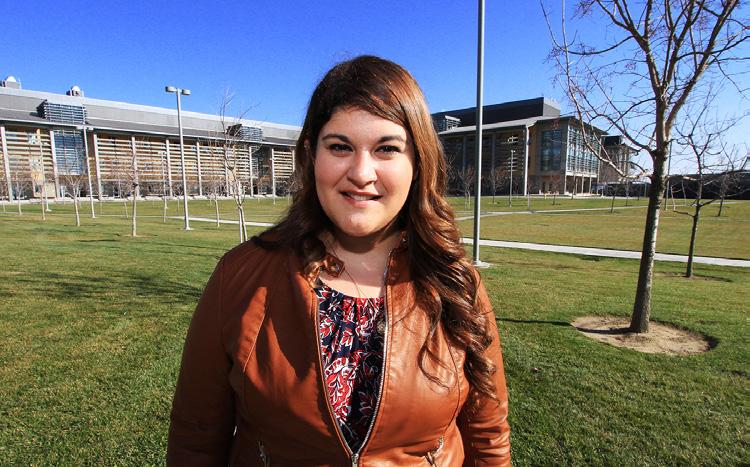
Assistance at the campus and her younger brother Federico is a Management Major.
Jennifer plans to give back to the community after she graduates by working with local schools to educate younger students about college access.
10% is a first-of-its-kind initiative to put a UC Merced student into every middle school beginning next school year to discuss the importance of high school graduation.
The program, which is a partnership between MCOE, UC Merced and the Merced County District Attorney, utilizes volunteer UC Merced students, many of whom have come from challenging backgrounds, to speak directly to middle school students about their personal experiences, the importance of high school graduation and how they were able to make the choices that enabled them to gain admission to a UC campus.
She plans to attend graduate school and earn a doctorate after completing her bachelor’s degree.
“I know that if I stay here (after graduation) it will be easier to give back to my community,” she adds.
Merced County Project 10% presented to more than 4,000 Merced County students at 18 schools in 2013 with a volunteer base of 37 UC Merced students.

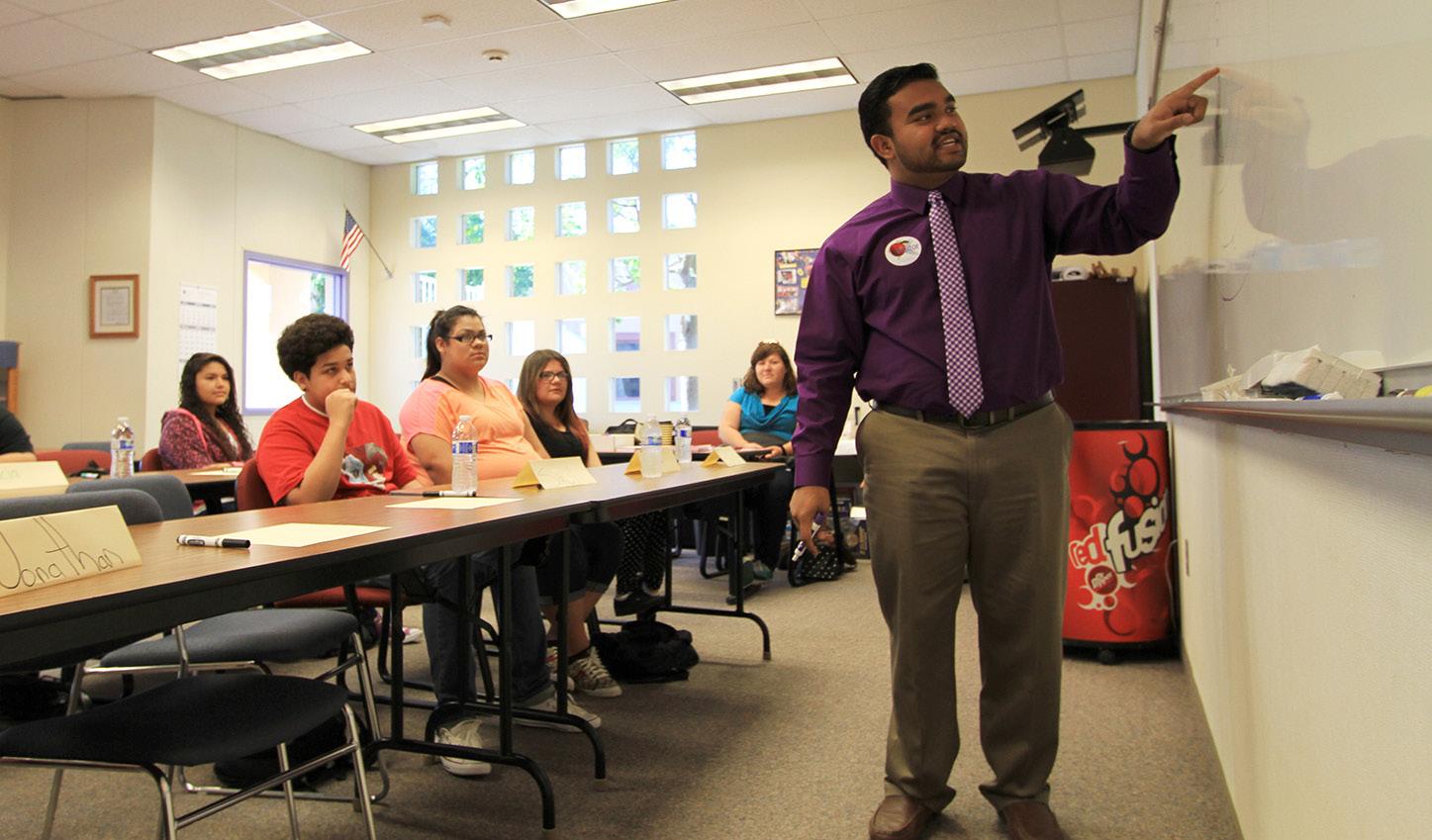
Merced County students have a myriad of opportunities to participate in student recognition programs, many of which are operated by the Merced County Office of Education. Open to all public and private schools, these programs teach students about leadership, teamwork and the value extracurricular activities have on an education.


The Merced County Spelling Bees are open to students grade 4-8 and are split into elementary and junior high events. MCOE provides the practice word list to school districts near the beginning of the school year, which is about 50 pages of words that could be used during the Bee. Unlike the traditional oral competitions, words and definitions are read aloud by the Spelling Master. Students then write out the word, which is reviewed by a proctor. Students who earn first and second place go on to the state spelling bee championship.

Celebrating its 33rd year in Merced County in 2014, the Academic Decathlon pits area high schools against each other in a scholarly contest. Students compete in the areas of art, economics, language and literature, mathematics, music and science. Local businesses show support by donating money that goes toward student scholarships. Merced College generously offers the use of its classrooms and theater for the event. Students are honored at the public awards reception. Pictured at right is the 2013 top scoring team, Merced High School.
Introduced in early 2011 by Assemblymember Julia Brownley, Assembly Bill 815, the State Seal of Biliteracy, is a verification of linguistic proficiency. The honor, which is listed on student transcripts, is awarded by the Merced County Office of Education in partnership with county school districts in recognition of attained proficiency in English and at least one other world language by high school graduation. Pictured at left is a student speaking at the awards ceremony. In 2013, 73 students from Merced County earned the accolade.
STRIVE — which stands for Safe, Trust, Respect, Inspiration, Vision, Encouragement — is a restorative justice model implemented at all Valley Community Schools in Merced County.
The program started in part because of AB 1729, which states alternative methods of correction should be used before a student is suspended or expelled, but also to develop and maintain positive relationships between students and staff.
While a formal school discipline model focuses on a system of punishment and reward, the restorative justice model encourages a culture of mutual respect and recognizes the behavior as a bad choice.
Instead of a referral, students and staff begin a mediation process and follow a behavior intervention plan.
This gives students and staff an opportunity to air grievances and discuss the problem to restore the relationship instead of a traditional,
formal punishment.
This process helps to give misbehavior a context, so the student sees how their actions affect others.
It also reduces the amount of time spent on discipline because it addresses the root of the problem. Students may be assigned in-school suspension for up to five days.
The in-school suspension curriculum is designed to help improve students’ academic and social skills and provides counseling.
Full-day home suspensions have dropped a staggering 58 percent since the implementation of the STRIVE program.
In August, Merced County school and law enforcement officials converged at Merced College for a training exercise conducted by the Sheriff’s Department to prepare county school administrators for the possibility of a gunman coming onto a campus. During the day of training and simulations, 41 school administrators, which included principals, vice principals and superintendents, had the opportunity to see first-hand how law enforcement officials would coordinate their efforts and respond to a shooter on a school campus. Training events like this give educators the valuable tools to coordinate with law enforcement in the event of a violent situation on campus.
In 2010-2011, Le Grand High School Principal Javier Martinez suspended 49 students and expelled six. The following year, he suspended 15 and expelled only one. This is in part because of the Restorative Justice League of Le Grand High. Operated by after school program coordinator Andre Griggs, the student-led Restorative Justice League has trained other students to be mentors for incoming freshmen.
They even hosted a restorative justice conference for students from surrounding school districts. Team members also started a freshman apprenticeship program, so that students can develop restorative justice leadership skills earlier rather than waiting until their senior year. The restorative justice program coincides with after school and parent outreach programs.
More than 40 school administrators from districts throughout Merced County participated in an active shooter training at Merced College in August. Conducted by the Merced County Sheriff’s Department, the training put school officials in scenarios with a gunman on campus.
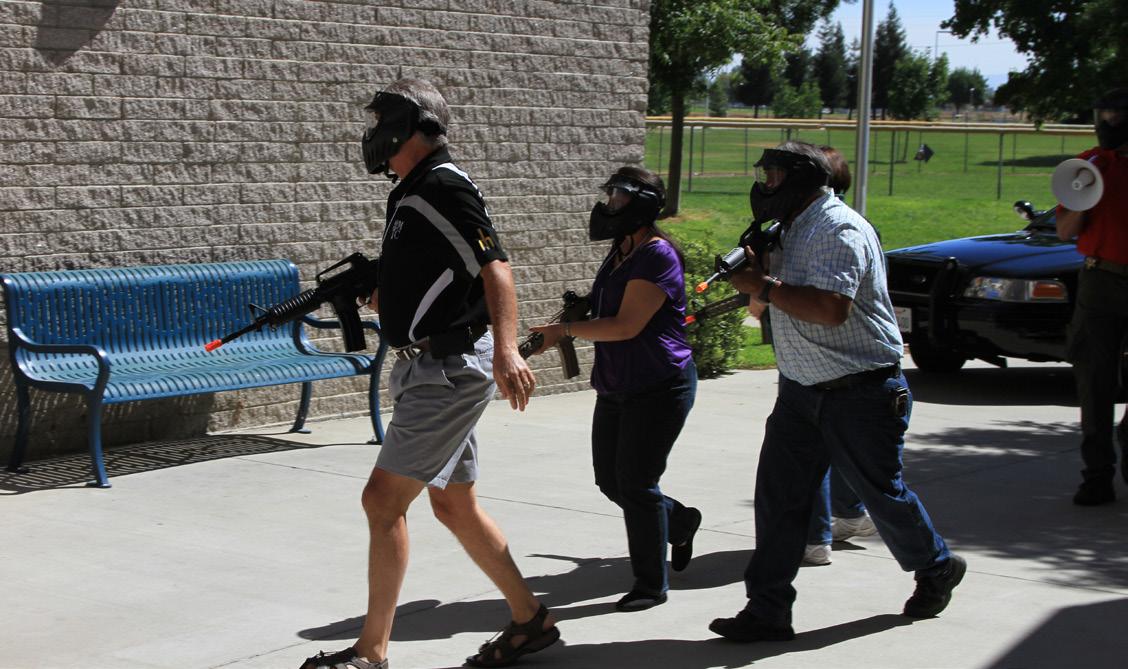
This is a year of historic change for Merced County students. With the implementation State Standards and the voter-approved passage of Proposition 30 , students al-world curriculum, a funding mechanism that gives local school districts more spent and accountability over how the new system will work. Combined, this will
On August 2, 2010, the California State Board of Education adopted the Common Core State Standards (CCSS). The CCSS are designed to allow students to develop creativity and collaborative, critical thinking and communication skills. CCSS will prepare students to be college and career ready in reading, writing, speaking and listening, across all disciplines, including mathematics. By the time students leave high school, they will have mastered the literacy skills they need to go forward, in their own time and in their own way, to a college or career path of their choosing. Prepared in rich content knowledge, relevant thinking skills and the expertise to be successful in the college of their choice and in their chosen careers, students will be ready and able to address 21st Century challenges.
The Local Control Funding Formula (LCFF) represents a historic shift in how California funds public schools. Instead of allocating funds for programs and services the state determines are a priority, the new funding formula gives local school boards control over how to use funds and resources in a way that improves outcomes and opportunities for all students. The new funding model specifically addresses students with greater needs. English Language Learners, foster youth or low socio-economic status students have greater needs and require more resources. LCFF presents a historic opportunity to focus on improving student outcomes, closing achievement gaps, and increasing the level of communication between our schools and our community.
implementation of the Common Core students will reap the benefits of a remore control over how moneys are will give students the tools to succeed.
An important component of the LCFF, the Local Control and Accountability Plan (LCAP) gives control to school districts, which must develop a plan aligned with improving student academic achievement and closing the achievement gaps. The plan must address eight priorities: Student Achievement, Student Engagement, School Climate, Basic Services, Implementation of Common Core State Standards, Parental Involvement, Course Access and other Student Outcomes. School districts will work with parents, educators, employees and the community to establish these plans. The plans will describe the school district’s overall vision for students, annual goals and specific actions the district will take to achieve the vision and goals.
The Smarter Balanced assessments will replace the former California State Standards Test. Smarter Balanced assessments will go beyond multiple-choice questions to include extended response and technology enhanced items, as well as performance tasks that allow students to demonstrate critical thinking and problem solving skills. Performance tasks challenge students to apply their knowledge and skills to respond to complex real-world problems. These activities are meant to measure capacities such as depth of understanding, writing and research skills, and complex analysis. This approach represents a significant improvement over traditional paper-and-pencil assessments, providing scores that are more accurate for all students.
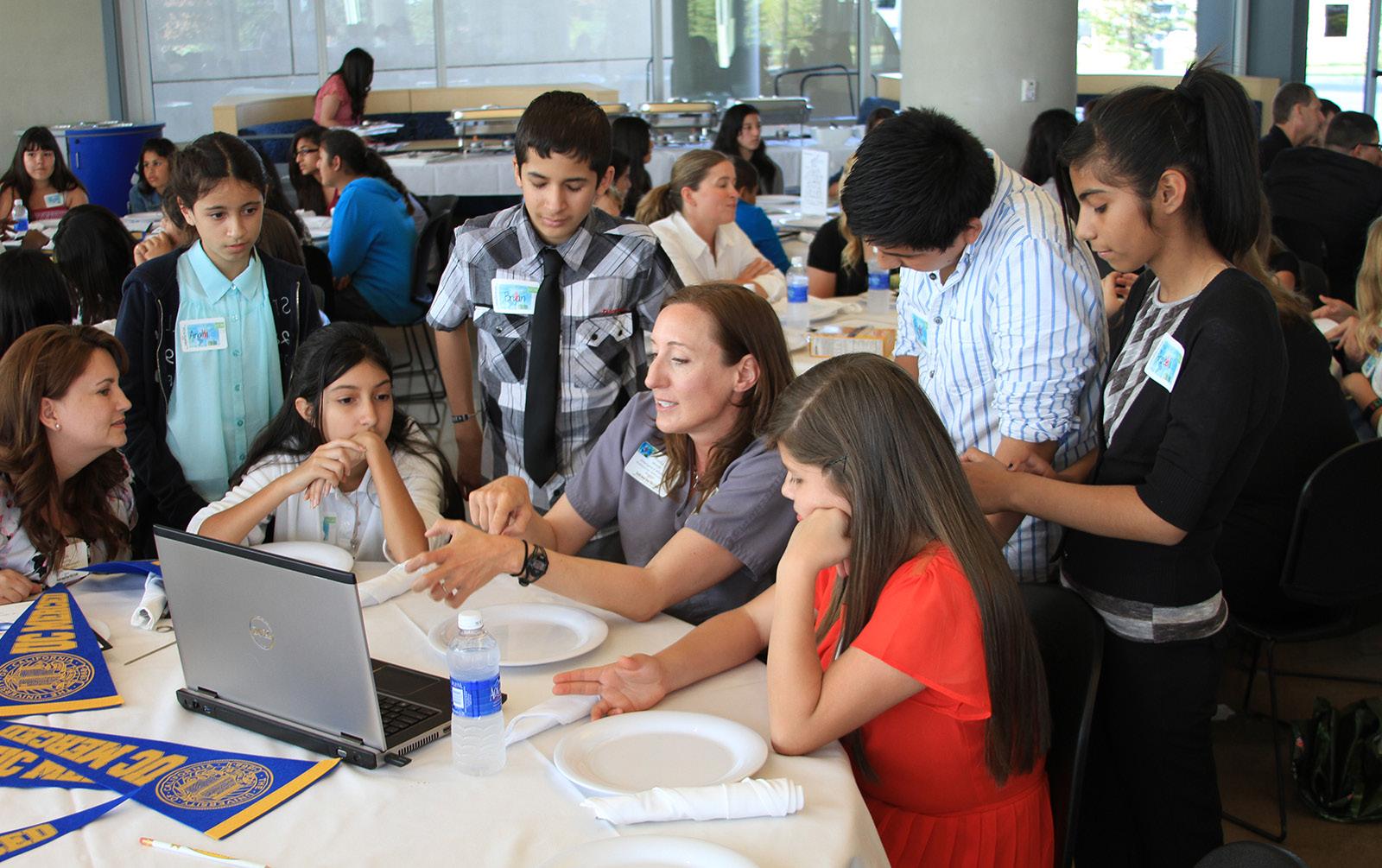


The Schools and Local Public Safety Protection Act of 2012 , approved by the voters on November 6, 2012, temporarily increases the state’s sales tax rate for all taxpayers and the personal income tax rates for upper-income taxpayers. The revenue generated by the measure’s temporary tax increases is included in the calculations of the Proposition 98 minimum guarantee — raising the guarantee by billions of dollars each year. School districts receive these tax dollars through a new Education Protection Account (EPA) as established by Prop 30. Because voters were assured these taxpayer dollars would be spent for instructional purposes, full disclosure of school district expenditures is available to the general public. All school districts are required to post financial expenditure information of these EPA funds to school district websites. Merced County Office of Education and all Merced County school districts were provided more than $62 million for the 2012-13 fiscal year.
Since there is a change in curriculum with the implementation of the CCSS, it makes sense to change the way in which students are assessed. Assembly Bill 484 helps with this transition by suspending many of the statewide assessments beginning this year. This bill authorizes State Superintendent of Public Instruction Tom Torlakson to not provide an API score to a school or school district since a transition to the new standards-based assessments would compromise comparability of results. The bill also prohibits the comparison of CAASP assessment results with results from STAR assessments that measure previously adopted content standards. MCOE is working with districts to prepare for this next generation of student assessments by providing professional development to support instruction and assistance with technology.
Students in the Atwater Elementary School District had a sobering experience about making tough choices during an event at Mitchell Senior Elementary School. The Drug Store Project is a day-long event in which students are taken through a journey of vignettes, observing the potential consequences of drug use. Organizations ranging from law enforcement, schools, county agencies and health care organizations were on hand to teach students about the danger of drugs. Though sixth grade may seem early to impart these lessons on children, there is research that points to it as an appropriate age.

Gustine High School celebrates its 100th year of operation in 2014 with a celebration planned on July 5. On Sept. 8, 1913, the school opened with two teachers and 20 students. The school was needed because of a lack of modern roads in the rural West Side of Merced County. The school now has an enrollment of just over 500 students who are served by approximately 30 staff members, including administrators, faculty members and classified personnel.

More than 50 students in the Weaver Union School District took part in the district’s production of “The Little Mermaid Jr.” Students went through the process of auditioning and rehearsing that culminated with five performances, all at the Merced Theatre. This isn’t Weaver’s first big scale production, in fact, it is the eighth musical since the district started performing musicals with “The Wizard of Oz” in May, 2003. Jeff Sanders, teacher at Weaver and director of the musical, says, “most students will memorize lines, stage directions, songs and dances. In the end, they will perform in front of audiences of up to 1,100 people. Every child will have a different experience, but some of these students will gain so much in confidence and skill that it will change their future in a positive way.”

The Merced County Office of Education’s Regional Occupational Program hosts an annual Career Industry Day at the Merced County Fairgrounds that gives approximately 1,000 sophomores from Merced County high schools, and Chowchilla High School, the opportunity to explore career options in California’s 15 industry sectors. The largest career exploration event in the Central Valley, sectors of industry including agriculture, business and marketing, arts and communication, education, automotive transportation services and health care, among others. Pictured at left, State Senator Anthony Cannella participated in the 2013 Career Industry Day.
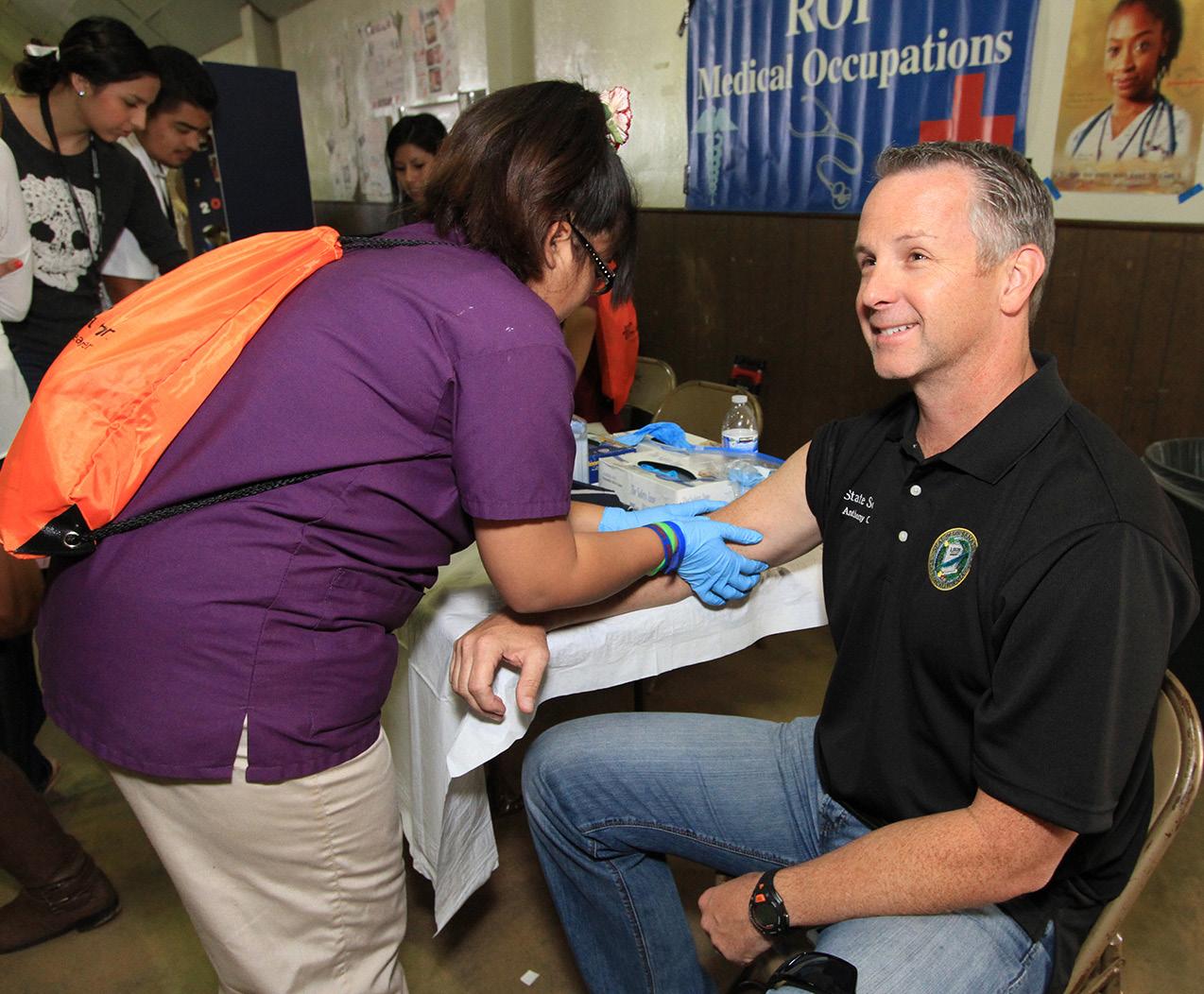
For eight years, the Merced County Office of Education and Educational Employees Credit Union have recognized Excellence in Education in Merced County. In 2013, the program expanded to honor both teachers and other school employees. There were six nominees for school employee of the year and seven nominees for teacher of the year, with top honors in both categories going to the Los Banos Unified School District. The Merced County Teacher of the Year advances to the state awards program.
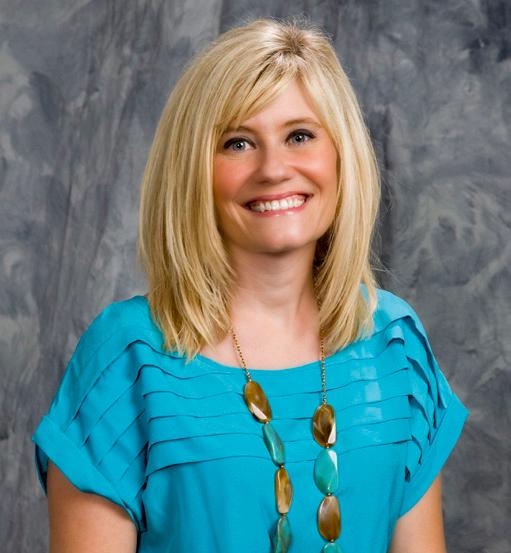
Merced County Office of Education’s Early Education Department was awarded a $915,000 Race to the Top grant in 2011, titled Quality Counts! In Merced County. The goal is to ensure that children have access to high quality programs that profoundly shape a child’s ability to succeed in school and life. This will be accomplished through the implementation of a local Tiered Quality Rating Improvement System (TQRIS) that focuses on three areas: a child’s readiness for school; teacher interactions with children; and overall program quality and classroom environment. Recently, Quality Counts! In Merced County received an additional $297,000 to expand its efforts into Madera and Mariposa counties.

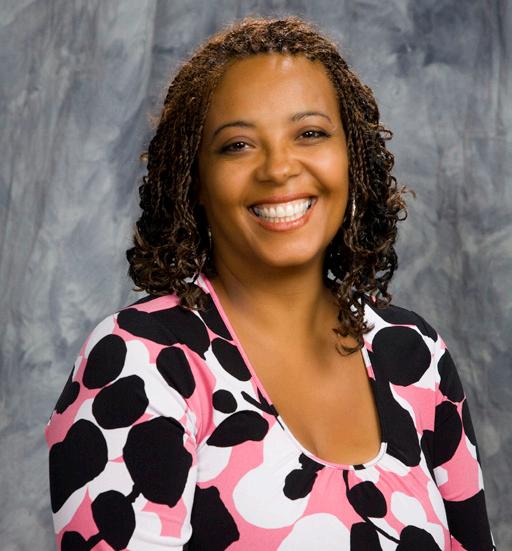
Nearly 120 volunteers from Educational Employees Credit Union, Merced School Employees Federal Credit Union and Merco Credit Union came together to paint, stack, clean and rebuild at Camp Green Meadows in late August.
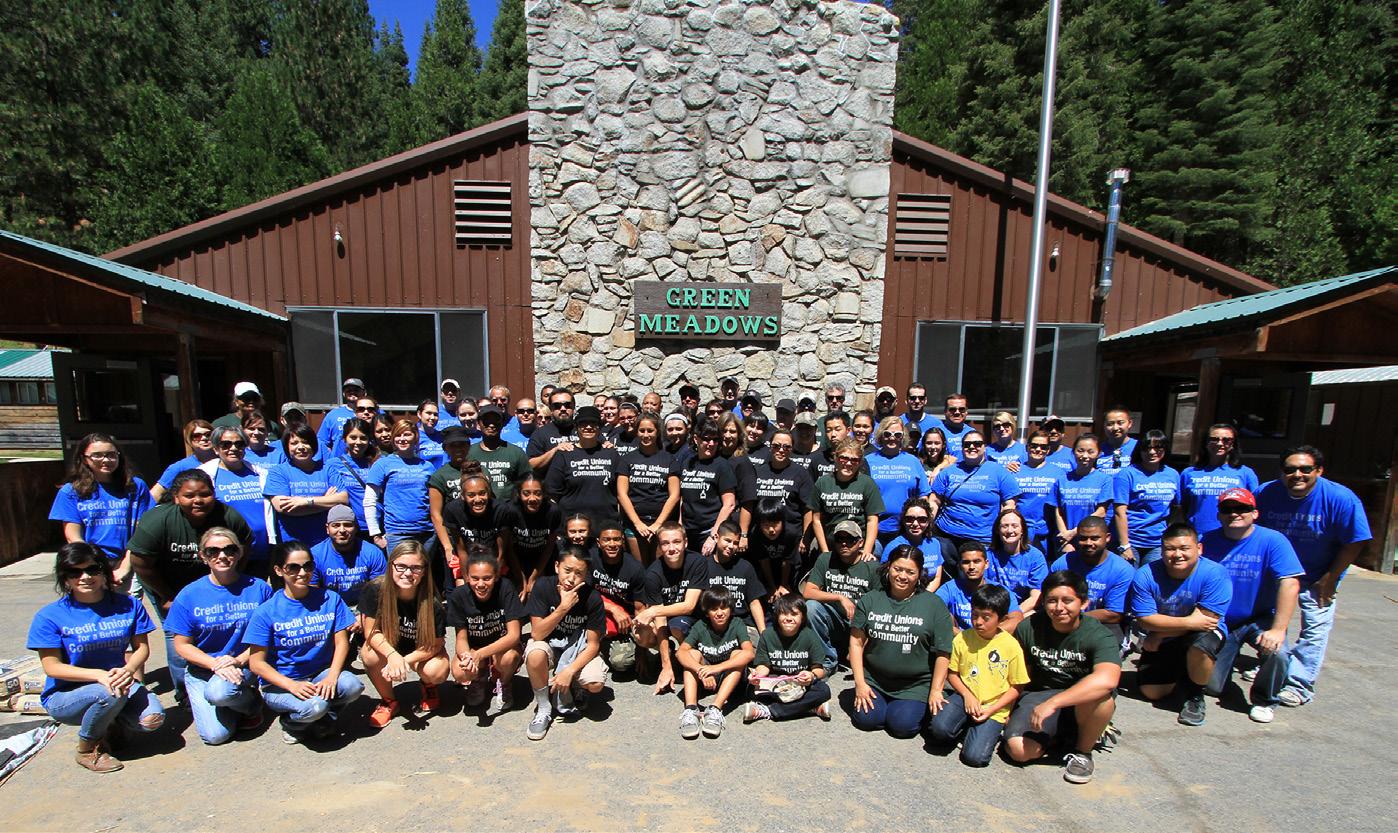
The list of tasks ranged from painting picnic tables and splitting and stacking firewood to rebuilding the archery back stop and constructing a retaining wall, among others.
Bob Bassett, the principal at Green Meadows, says, “this many people working and smiling together was a joy to see and the work they did made a real difference on campus.”
Volunteers from Educational Employees Credit Union, Merced School Employees Federal Credit Union and Merco Credit Union came together for a massive cleanup at Camp Green Meadows near Fish Camp in late August. It’s estimated the nearly120 volunteers put in close to 300 hours of work, collectively. The outdoor school focuses on ecology, Earth science and team building and celebrates its 50th year of operation in 2014.

Stifel Nicolaus & Company is the leading underwriter of municipal bonds for California K-12 school districts, selling more school bond issues during the past five years than any other firm. With the merger of Stifel Nicolaus and Stone & Youngberg LLC in 2011, the firm has a history of assisting public agencies in California with their bond financing needs since 1931.
Bond Underwriters & Financial Advisors


Educational Employees Credit Union is the 67th largest credit union in the U.S., the 13th largest in California, and the largest locally-based credit union in the Central San Joaquin Valley. As of December 31, 2013, the credit union had more than 220,000 members and over $2 billion in assets. EECU has branches in Fresno, Clovis, Hanford, Merced, Madera, Reedley, Selma and Visalia.
Merced School Employees Federal Credit Union was formed in 1954 by seven school employees and has grown into a full service financial institution with four branches located in Merced, Atwater and Los Banos. The field of membership consists of school employees in Merced and Mariposa Counties, including UC Merced and Merced College, MSEFCU and McClatchy Publishing Co. employees, high school students, UC Merced students and eligible Merced College students along with the immediate family of each group.
Headquartered in Vacaville, Travis Credit Union is a not-for-profit, cooperative financial institution serving those who live or work in Solano, Yolo, Sacramento, Placer, San Joaquin, Stanislaus, Napa, Contra Costa, Alameda, Sonoma, Colusa and Merced Counties. Currently, Travis Credit Union is the 12th largest credit union in California, with more than 161,000 members and over $2.1 billion in assets.
T he Merced County Education (MCE) Foundation was established to support programs and activities which maximize academic achievement and educational enrichment for students in Merced County. The MCE Foundation will strengthen and support collaborations and partnerships among the MCOE, businesses, foundations, agencies, organizations and families.
Educational Employees Credit Union
Merced School Employees
Federal Credit Union
Hilltop Ranch, Inc.
PLATINUM SPONSORS
Community Foundation of Merced County
GOLD SPONSORS
Fluetsch & Busby Insurance
Stewart Family/Delta Sierra Beverage
SILVER SPONSORS
County of Merced Board of Supervisors
Doug Fluetsch
Foundation For Medical Care of Tulare & Kings Counties
Steve & Victoria Gomes
Hoffman Electronic Systems
Jeanne & Mark Knapp
Jean Okuye • Travis Credit Union
James & Janell White
David & Holly Zacharias
Robert & Yvonne Ayers
Kathleen Crookham
CTA Merced/Mariposa Teachers
Uniserv Council
Delta Farms Trucking, Inc.
Michele & Frank Fagundes
Gallo Cattle Company
Kathy & Ron Hansen
Hilmar Cheese Company, Inc.
Kagome, Inc • Kiwanis Club of Merced
Live Oak Farms
Mason, Robbins, Browning & Godwin
Merced County NAACP Branch #1047
Merced School Employees

Federal Credit Union Employees
Michelle Oldenhage
Riggs Ambulance Service, Inc.
Beverly Ryan • Demetrios Tatum
Tesei Petroleum • The Pentagon Company
Tinetti Realty Group • Rhonda Walton
Ann and Lee Andersen • Peggy Biddison
James Binion • CalPrime
Central Valley Nephrology
Medical Association Inc.
Keith Chastain • Mary Ellen & John Chavez
Kent Christensen • DLP Real Estate, Inc.
Elizabeth Dooley • Evelyn Eagleton
Lisa Escobedo • Lydia Flores
Foundations Public Schools
Frances Gallegos • Lori Gattuso
Golden Valley Engineering & Surveying, Inc.
Edgardo Gomez • Marigene Gordon
Fred Honore • Image Masters
Marie Janz • Elvira Lopez • Lee Lor Lifestyle Community Investment, LLC/Lorenzi Rentals
Rebecca Lincoln • Norma Mahurin
Marie’s Mexican Kitchen
Jennifer Mockus • Ed Morford • May Moua
Holly Newlon • Jerry O’Banion Office Depot • Antonio Ortiz
Ann Peters • Teresa Pitta
Nathan Quevedo • Janice Rogge
Sengsouly Sanychanh-Vang
Hoof Health • Slaters Home Furnishings
Soldavi Realty • Stefani Family Trust
Sponsor list as of February, 2014
For the second year, approximately 40 foster youth had the opportunity to spend one week at Camp Green Meadows, Merced County Office of Education’s outdoor school located in Fish Camp near Yosemite National Park. They explored the outdoors and were exposed to many educational areas such as astronomy, archeology, culture and wildlife ecology. Equally important, they worked on team-building skills while enjoying themselves in Yosemite National Park.
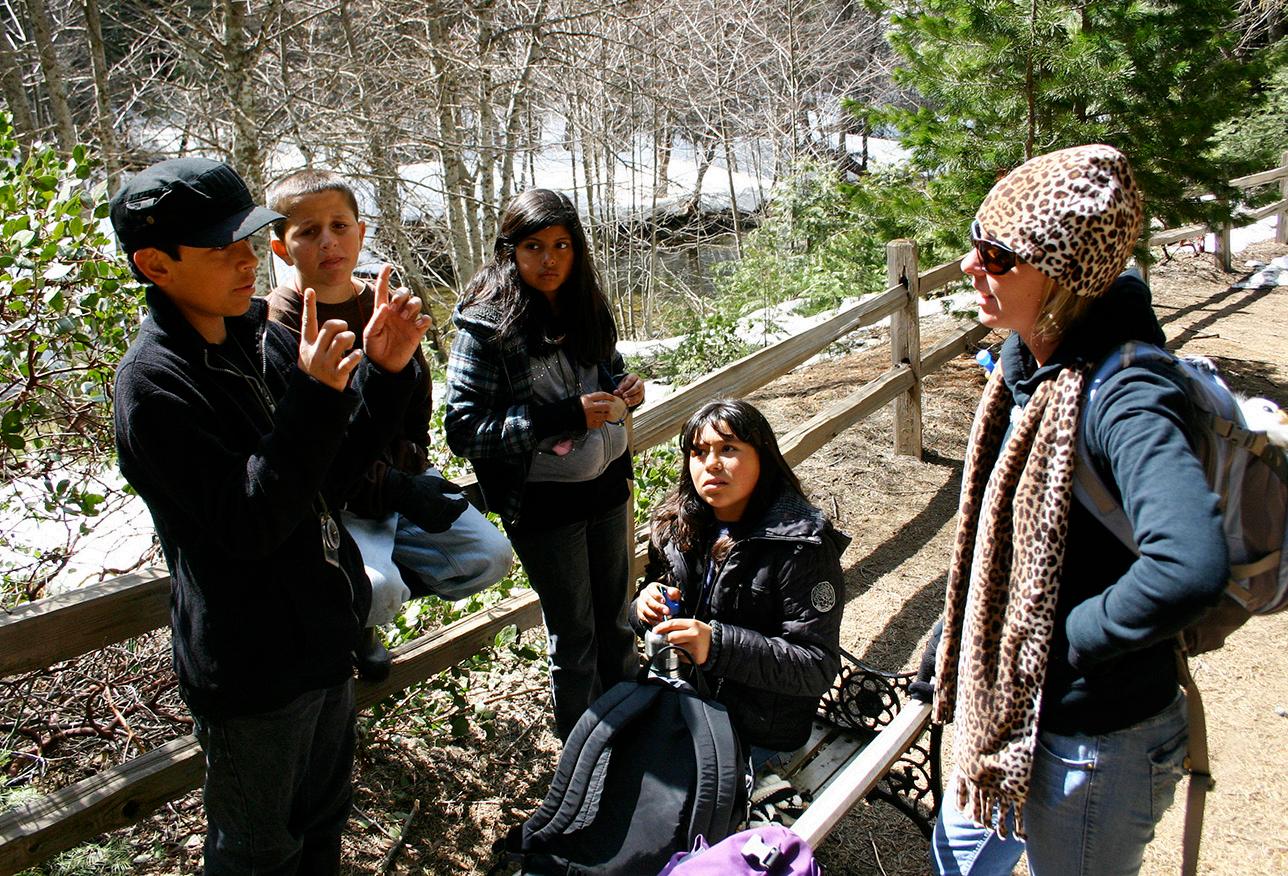
The MCE Foundation, in collaboration with the Merced County Farm Bureau, MCOE and the Merced City School District, provided all third grade students from Merced County the opportunity to see where the food they eat comes from. The learning experience, held at the Merced County Fairgrounds, increased students’, teachers’ and chaperones’ awareness of locally-grown specialty crops produced in Merced County and taught children the importance of agriculture’s role in history, economics and health, while introducing them to healthy food choices.

2,014 in
2014
The MCE Foundation is on a mission to obtain 2,014 donors in 2014, who will commit to a minimum of $5 monthly, tax-deductible donation. Help the Foundation meet this goal to provide enhanced learning opportunities for our students in Merced County!
To become an MCE Foundation sponsor, contact Lee Lor at (209) 381-6601.
Frequent changes of homes and schools have a detrimental effect on foster youth, especially their academic performance and future success. A large percentage of children placed in foster care experience physical and emotional trauma as a result of abuse, neglect, separation from family and thus lack a stable home. This experience provided foster youth in Merced County, grades six through eight, the opportunity to learn and build on their academics, social skills and self esteem.
The Business Services department provides accounting, budgeting, information technology, purchasing and facility development and construction services to various MCOE programs. Business Services also oversees maintenance and operation support for many county sites, including maintenance of a large vehicle fleet. In addition, business advisory, financial services, technology services and payroll processing services are provided to the 20 school districts in Merced County, as well as the responsibilities of fiscal oversight through the AB1200 process. With the advent of LCFF the Business department in conjunction with the Instructional Services department is directed by the state to review and approve the LCAP of the school districts within the county.
The Career and Alternative Education Department operates schools and programs in service to students and school districts. Merced Scholars Charter School provides middle and high school students a non-classroom based, personalized learning model of education; Valley Community and Court Schools provides a comprehensive education program for at-risk K-12 students who learn best in alternative programs; the Regional Occupational Program (ROP) provides career-technical training courses and services to high school and adult students; Foster Youth Services assists students, ages 4-21, who are placed in state licensed group homes and foster homes to improve academic achievement; the Empower Program prepares students for college and career; the Youth Opportunity Program supports students toward high school completion and college and career readiness; the California Student Opportunity and Access Program (Cal-SOAP) improves the flow of information about postsecondary education/financial aid, and raises achievement levels of targeted students through collegiate academies established on high school campuses; and Building Healthy Youth AmeriCorps Program provides mentors to at-risk middle school and high school students to reinforce positive choices and behaviors.
The Early Education Department provides leadership and operates multiple programs to ensure quality early education services to our community. Programs include Early Head Start, Head Start, Child Care Resource and Referral services for accessing licensed child care, Child Care Subsidy Payment services, the California Preschool Instructional Network (CPIN), the Family Resource Council and Parenting Center, Caring Kids, Abriendo Puertas, the Local Child Care and Development Planning Council, and workforce development services for early education professionals. The Early Education Department also implements the Race To The Top-Early Learning Challenge grant called Quality Counts! In Merced County.

381-6627
Human Resources staff administer personnel activities for the Merced County Office of Education. These activities include employee recruitment and selection, employment related counseling, leadership development, maintenance of employment records as well as negotiating, implementing and administering collective bargaining agreements for represented staff. Human Resources coordinates compensation and benefits for internal staff. The office also provides credentialing advice and monitoring to Merced County certificated personnel.
(209) 381-6634
Instructional Services delivers support services based on researched-based practices and data-informed decision making to meet the ongoing challenges of Common Core State Standards implementation, and preparing for a new assessment and funding system. The ASSETS after school program, Camp Green Meadows Outdoor Education, Merced Educational Television (METV), Migrant Education, The Administrative Keys Tier II Credential Program, Beginning Teacher Support and Assessment (BTSA) and Special Events, which operates the Academic Decathlon and many other special events, are all located in Instructional Services. The department also leads the Merced County Seal of Multilingual Proficiency process In 2013, the Instructional Services staff provided professional development and technical assistance to all 20 school districts, reaching approximately 1,500 teachers and 100 administrators.

Special Education provides a wide range of services for children and young adults with special needs. Ranging in age from newborn to 22 years, these young people need special education for disabilities. They are served in a variety of places: homes, local schools, and schools with specialized classes. Services are available to students residing in Merced County. Services include special classes for students with significant disabilities, the deaf and hard of hearing program, the emotional disturbance program, adaptive physical education services, occupational and physical therapy, the visually impaired program, the orthopedically impaired program, early start infant care, the early intervention autism program, speech and language development, nursing and health assistance, school psychologist and staff development. The Merced County Special Education Local Plan Area (SELPA) ensures that quality special education programs and services are available throughout the region. The SELPA provides staff development, information system technology and technical assistance, transition planning support, education related mental health services, among other services.

Steven E. Gomes, Ed.D
Mary Ellen Chavez
Dennis Hanks
Fred Honoré David R. MarchThe mission of Merced County Office of Education, as the educational leader of the Central Valley and trusted community partner, is to transform education and inspire personal, social, and academic achievement of students through collaborative partnerships, accountable leadership and innovative, high quality programs and services.


Atwater Valley Community School
1800 Matthews Ave., Atwater (209) 381-4550
Los Banos Valley Community School
715 West H St., Los Banos (209) 827-5600
Merced Valley Community School
1850 Wardrobe Ave., Merced (209) 381-4501
Floyd A. Schelby School
6738 N. Sultana Dr., Livingston (209) 394-7420
Merced Scholars Charter School
808 W. 16th St., Merced (209) 381-5165
Green Meadows Outdoor School
77798 White Chief MT. Rd., Fish Camp (559) 642-0122
Merced County Juvenile Court School
2840 W. Sandy Mush Rd., Merced (209) 381-1414
We welcome your questions, comments and feedback. Please email us at info@mcoe.org.
• Annually, all staff will report improved communication, morale, trust, and accountability within MCOE.
• All clients will report that MCOE has provided innovative and high quality programs that resulted in increased learning.
• Clients will report that MCOE has promoted a college-going culture and meaningful career pathways; the number of Merced County students enrolling and succeeding in institutions of higher education increased annually.
Atwater ESD
Ballico-Cressey ESD
Delhi USD
Dos Palos-Oro Loma JUSD
El Nido ESD
Gustine USD
Hilmar USD
Le Grand UESD
Le Grand UHSD
Livingston UESD
Los Banos USD
McSwain UESD
Merced City SD
Merced River UESD
Merced COE
Merced UHSD
Plainsburg UESD
Planada ESD
Snelling-Merced Falls UESD
Weaver USD
Winton ESD
Sandra Schiber, Ed.D.
Bryan Ballenger
Brian Stephens, Ed.D.
Brian Walker, Ed.D.
Rae Ann Jimenez
Ronald Estes, Ed.D.

Isabel Cabral-Johnson
Rosina Hurtado
Donna Alley
Andres Zamora
Steve Tietjen, Ed.D.
Stan Mollart
RoseMary Parga-Duran, Ed.D.
Helio Brasil, Ed.D.
Steven E. Gomes, Ed.D.
Scott Scambray, Ed.D.
Kristi Kingston
Jose Gonzalez
Alison Kahl
John Curry
Randall Heller